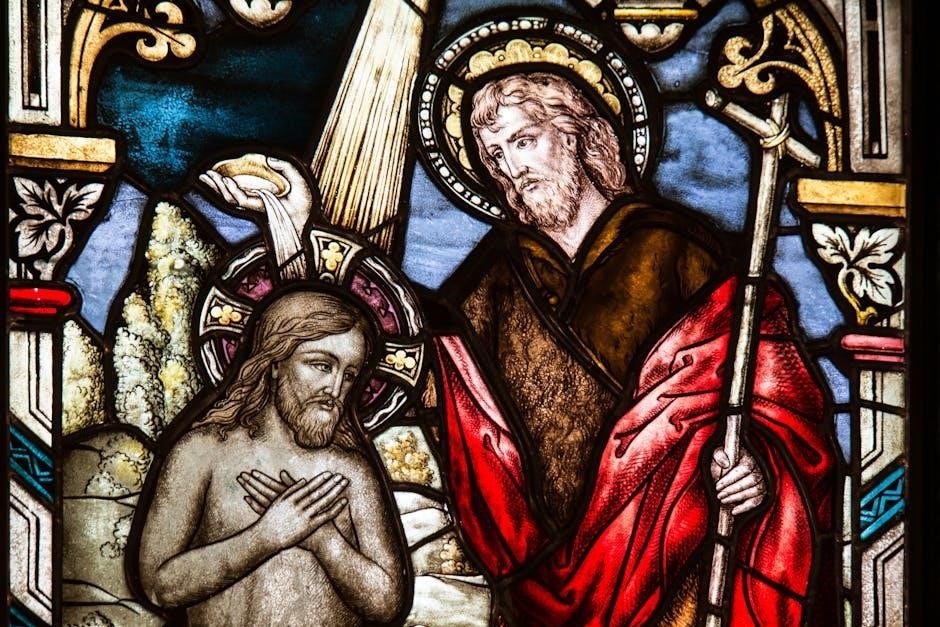Howard Thurman’s seminal work reinterprets Jesus’ teachings for the oppressed, offering a powerful theological framework for social justice and nonviolent resistance, inspiring movements for equality․
Author Background: Howard Thurman
Howard Thurman was a renowned African-American theologian, philosopher, and civil rights leader, born in 1900 and passing in 1981․ He served as a pivotal figure in interpreting religious teachings for social justice․ Thurman was the first African American to hold a dean position at a predominantly white university․ His work, deeply rooted in Christianity, emphasized nonviolent resistance and survival techniques for the oppressed, inspiring movements like the Montgomery Bus Boycott․ His legacy endures as a cornerstone of modern theological thought and activism․
Book Premise: Interpreting Jesus’ Teachings for the Oppressed
Howard Thurman’s Jesus and the Disinherited reinterprets Jesus’ teachings through the lens of the oppressed, offering a theological framework for survival and liberation․ Thurman argues that Christianity, as envisioned by Jesus, serves as a survival technique for marginalized communities, emphasizing nonviolent resistance and hope․ The book critiques systemic oppression and explores themes like fear, hypocrisy, and hatred, positioning Jesus as a symbol of resilience for the disinherited․ Its message of love and justice has profoundly influenced social justice movements, including the civil rights movement․

Historical Context of the Book
Published in 1949, amidst a backdrop of social change, the book emerged from lectures delivered at Samuel Huston College, addressing the struggles of the marginalized․
Publication in 1949: A Time of Social Change
Published in 1949, Jesus and the Disinherited emerged during a pivotal era of social transformation in the United States, marking the early stages of the civil rights movement․
Thurman’s work resonated deeply with the struggles of marginalized communities, offering a theological foundation for nonviolent resistance and hope, aligning with the broader movement for racial equality and justice․
Origin from Lectures at Samuel Huston College
Jesus and the Disinherited originated from a series of lectures Howard Thurman delivered at Samuel Huston College in Austin, Texas, in April 1948․
These lectures laid the groundwork for Thurman’s exploration of Jesus’ teachings as a source of empowerment for the oppressed, emphasizing themes of nonviolent resistance and survival techniques for marginalized communities․
The lectures were well-received, prompting Thurman to expand his ideas into the book, which became a cornerstone of theological and social justice discourse․
Key Themes Explored
Thurman explores Jesus’ teachings as empowerment for the oppressed, emphasizing nonviolent resistance and addressing fear, hypocrisy, and hatred as obstacles to liberation and social justice․
Nonviolent Resistance: A Path to Social Change
In “Jesus and the Disinherited,” Howard Thurman highlights nonviolent resistance as a transformative strategy for social change․ Drawing from Jesus’ teachings, Thurman argues that nonviolence not only challenges systemic oppression but also empowers the marginalized to reclaim their dignity․ By emphasizing love and compassion, Thurman provides a moral framework that inspired leaders like Martin Luther King Jr․ to adopt nonviolent methods during the civil rights movement, proving its effectiveness in fostering justice and equality․
The Three Hounds of Hell: Fear, Hypocrisy, and Hatred
Howard Thurman identifies fear, hypocrisy, and hatred as the “three hounds of hell” that perpetuate oppression and torment the disinherited․ He argues that these forces thrive in societies marked by inequality and injustice․ Jesus, according to Thurman, confronted these evils directly, offering a path of liberation through love and truth․ By addressing these hounds, Jesus empowered the marginalized to resist oppression without succumbing to its destructive power, fostering resilience and hope among the oppressed․
Theological Concepts
Howard Thurman reinterprets Jesus’ teachings as a survival technique for the oppressed, emphasizing love, hope, and resilience in the face of systemic injustice and inequality․
Jesus as a Symbol of Hope for the Disinherited
Howard Thurman portrays Jesus as a symbol of hope for the marginalized, emphasizing his identification with the oppressed․ Jesus’ teachings, rooted in love and justice, empower the disinherited to resist oppression nonviolently․ Thurman argues that Jesus’ message transcends societal divides, offering spiritual strength to those facing systemic injustice․ This interpretation highlights Jesus as a beacon of resilience, providing moral and ethical guidance for those seeking liberation․ By focusing on Jesus’ solidarity with the oppressed, Thurman underscores his relevance as a source of hope in the struggle for equality and human dignity․
Survival Techniques for the Oppressed
Thurman identifies fear, hypocrisy, and hatred as the “three hounds of hell” that oppress the disinherited․ He argues that Jesus’ teachings offer practical survival techniques for the marginalized, emphasizing nonviolent resistance and love as transformative tools․ By embracing these principles, the oppressed can resist systemic injustice without being consumed by hatred․ Thurman’s interpretation equips the disinherited with spiritual resilience, enabling them to maintain dignity and hope in the face of adversity․ This approach remains a powerful guide for navigating oppression and fostering social change․

Influence on the Civil Rights Movement
Thurman’s work deeply influenced Martin Luther King Jr․ and the civil rights movement, shaping its philosophy of nonviolent resistance and love as a transformative force against oppression․
Martin Luther King Jr․ and the Montgomery Bus Boycott
During the Montgomery Bus Boycott, Martin Luther King Jr․ drew inspiration from Thurman’s teachings, emphasizing love and nonviolence as central to their struggle․ King often referenced Jesus and the Disinherited in his sermons, aligning the movement’s goals with Jesus’ message of liberation for the oppressed․ Thurman’s ideas on nonviolent resistance and the power of hope resonated deeply with King, shaping the boycott’s success and the broader civil rights movement’s philosophy of nonviolent protest against systemic injustice․
Role in Shaping the Movement’s Philosophy
Thurman’s Jesus and the Disinherited profoundly influenced the civil rights movement’s philosophy by reframing Jesus’ teachings as a blueprint for liberation․ The book emphasized nonviolent resistance, love, and hope, aligning Christian theology with the struggle for racial equality․ Leaders like Martin Luther King Jr․ adopted these principles, integrating them into their strategies and speeches․ Thurman’s work became a theological foundation for the movement, inspiring activists to view their struggle as a moral and spiritual quest for justice, rooted in the teachings of Jesus and the resilience of the oppressed․
Availability and Access
Jesus and the Disinherited is widely available in PDF, EPUB, and Kindle formats, published by Beacon Press and other editions, ensuring accessibility for modern readers globally․
PDF Versions and Digital Availability
PDF versions of Jesus and the Disinherited are readily accessible online, including a 1949 edition from the Internet Archive and a 2022 release by Beacon Press․ Digital platforms offer free downloads, enabling global readers to engage with Thurman’s seminal work․ Additionally, various academic and religious websites provide downloadable PDFs, ensuring the book’s message of hope and resilience reaches a broad audience, maintaining its relevance in contemporary social justice discussions․
Different Editions and Publishers
Jesus and the Disinherited has been published by multiple presses, including Abingdon-Cokesbury Press in 1949 and Beacon Press in 1976 and 1996․ A 2022 edition by Beacon Press offers a modern interpretation, maintaining its relevance․ Various digital editions are available, ensuring accessibility for contemporary readers․ These diverse publications highlight the enduring impact of Thurman’s work, bridging generations and preserving its vital message for global audiences․
Chapter Analysis
The book is divided into thematic chapters, with Chapter Two focusing on “The Impact of Fear,” exploring its role as a persistent challenge for the disinherited․
Chapter Two: The Impact of Fear
In Chapter Two, Thurman examines fear as one of the persistent challenges faced by the disinherited․ He argues that fear paralyzes and distorts the humanity of the oppressed, perpetuating cycles of subjugation․ Thurman draws from Jesus’ teachings to offer a counter-narrative, emphasizing courage and love as tools to overcome fear․ This chapter is pivotal in understanding how fear operates as a tool of oppression and how liberation can be achieved through spiritual resilience and communal solidarity․ Thurman’s analysis remains a powerful critique of systemic injustice and its psychological toll on marginalized communities․
- Fear as a tool of oppression․
- Jesus’ teachings as a counter-narrative to fear․
- The role of courage and love in liberation․
Interpretations of Jesus’ Teachings
Thurman interprets Jesus’ teachings as a powerful message of hope and liberation for the disinherited, emphasizing survival techniques for the oppressed; He highlights Jesus’ rejection of fear, hypocrisy, and hatred, advocating for a life rooted in love and justice․ Thurman’s interpretation underscores the universal relevance of Jesus’ teachings, offering a framework for marginalized communities to resist oppression and reclaim their dignity․ His work bridges theology and activism, providing a spiritual foundation for social change and equality․
- Jesus as a symbol of hope for the oppressed․
- Survival techniques for the disinherited․
- Rejection of fear, hypocrisy, and hatred․
Legacy and Relevance
“Jesus and the Disinherited” remains a cornerstone of modern theology, inspiring social justice movements and offering timeless wisdom for addressing systemic inequality and oppression today․
Modern Relevance in Social Justice
Howard Thurman’s insights in “Jesus and the Disinherited” continue to resonate deeply in contemporary social justice movements․ The book’s themes of nonviolent resistance and hope for the marginalized remain vital, addressing systemic inequalities and inspiring activists․ Thurman’s reinterpretation of Jesus’ teachings as a survival technique for the oppressed aligns with modern advocacy for human rights and racial justice․ His emphasis on love and inclusion provides a moral framework for addressing today’s socio-political challenges, ensuring the book’s enduring influence across generations․
Impact on Christian Theology
Howard Thurman’s “Jesus and the Disinherited” has profoundly influenced Christian theology by redefining Jesus’ teachings as a liberating force for the oppressed․ Thurman challenges traditional interpretations that often excluded marginalized groups, emphasizing instead the transformative power of love and justice․ His work shifts the focus from a Eurocentric view of the Gospels to one centered on the experiences of the disinherited, offering a theology of survival and resistance․ This perspective has reshaped modern Christian thought, inspiring a more inclusive and socially engaged faith that continues to resonate globally․

Social Justice and Religion
Howard Thurman’s work links faith with activism, advocating for the church to champion the oppressed and address systemic inequalities, blending spirituality with the pursuit of justice․
The Church’s Role in Advocating for the Poor
Howard Thurman emphasizes the church’s responsibility to stand with the poor and oppressed, advocating for justice and equality․ He argues that Christianity, as lived by Jesus, must align itself with the disinherited, providing survival techniques and hope for marginalized communities․ Thurman critiques the church for often failing to address systemic injustices, urging it to embrace its prophetic role in promoting love, dignity, and liberation; His vision calls for a spiritually grounded activism that transforms societies and uplifts the least privileged․
Contemporary Social Issues and the Book’s Message
Howard Thurman’s insights resonate deeply with modern social justice movements, addressing systemic racism, inequality, and oppression․ His teachings on nonviolent resistance and survival techniques remain relevant, offering hope to marginalized communities․ The book’s message of love, dignity, and liberation continues to inspire activists and scholars, providing a theological foundation for combating contemporary issues like poverty, discrimination, and social injustice․ Thurman’s vision of a compassionate society aligns with ongoing struggles for human rights and equality, making his work a timeless resource for change․
Educational Use
“Jesus and the Disinherited” is widely included in religious and social studies curricula, offering insights into theology, justice, and nonviolence, making it a valuable educational resource․
Inclusion in Religious and Social Studies Curricula
Howard Thurman’s “Jesus and the Disinherited” is increasingly incorporated into religious and social studies curricula, offering students profound insights into theology, social justice, and nonviolent resistance․ Its exploration of Jesus’ teachings through the lens of oppression provides a unique framework for understanding historical and contemporary struggles․ The book’s relevance to civil rights history and its emphasis on survival techniques for the marginalized make it a valuable resource for interdisciplinary education․ Its availability in PDF format further facilitates its adoption in academic settings worldwide․

Reviews and Critiques
“Jesus and the Disinherited” is widely acclaimed for its profound theological insights and relevance to social justice․ It has been cited over 1,000 times academically, showcasing its enduring impact and versatility in appealing to both religious and non-religious audiences․
Academic and Reader Responses
Howard Thurman’s “Jesus and the Disinherited” has garnered significant academic acclaim, with over 1,000 citations, reflecting its intellectual depth and enduring relevance․ Readers praise its accessibility, transcending religious boundaries to inspire both believers and non-believers․ The book’s themes of hope and resilience resonate deeply, making it a cherished resource for social justice advocates․ Its inclusion in curricula underscores its educational value, while its universal appeal bridges gaps between academia and general readers, solidifying its legacy as a transformative text․
Place in History
“Jesus and the Disinherited” holds a significant place in American religious thought, influencing the Civil Rights Movement and remaining a landmark text in social justice literature․
Significance in American Religious Thought
Howard Thurman’s “Jesus and the Disinherited” is a landmark in American religious thought, reframing Jesus’ teachings as a source of empowerment for the oppressed․ Its influence on the Civil Rights Movement, particularly through Martin Luther King Jr․, underscores its enduring impact․ The book challenges traditional interpretations of Christianity, advocating for a faith rooted in justice and compassion․ By centering the experiences of the marginalized, Thurman’s work remains a vital theological resource, bridging spirituality and social justice in a way that continues to resonate today․
“Jesus and the Disinherited” remains a timeless exploration of faith and justice, offering profound insights into Jesus’ teachings as a source of hope and empowerment for the marginalized․
Howard Thurman’s “Jesus and the Disinherited” reinterpret Jesus’ teachings through the lens of oppression, emphasizing nonviolent resistance and survival techniques for the marginalized․ The book, rooted in lectures delivered at Samuel Huston College, highlights fear, hypocrisy, and hatred as barriers to liberation․ It inspired leaders like Martin Luther King Jr․ during the civil rights movement, offering a theological framework for social justice․ Available in PDF and various editions, the work remains relevant today, advocating for hope and resilience among the oppressed while challenging systemic inequality․
Final Thoughts on the Book’s Enduring Message
Howard Thurman’s “Jesus and the Disinherited” remains a timeless beacon of hope, offering a powerful reinterpretation of Jesus’ teachings for the oppressed․ Its emphasis on nonviolent resistance and resilience continues to inspire modern social justice movements․ The book’s enduring message lies in its ability to transcend time, providing a theological foundation for combating fear, hypocrisy, and hatred․ As a PDF and in various editions, it remains accessible, ensuring its relevance for future generations seeking liberation and equality․